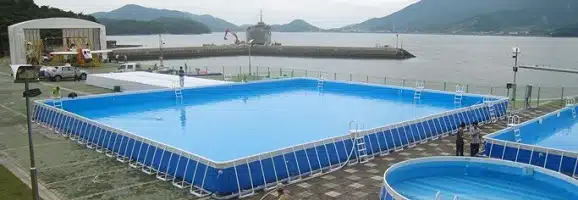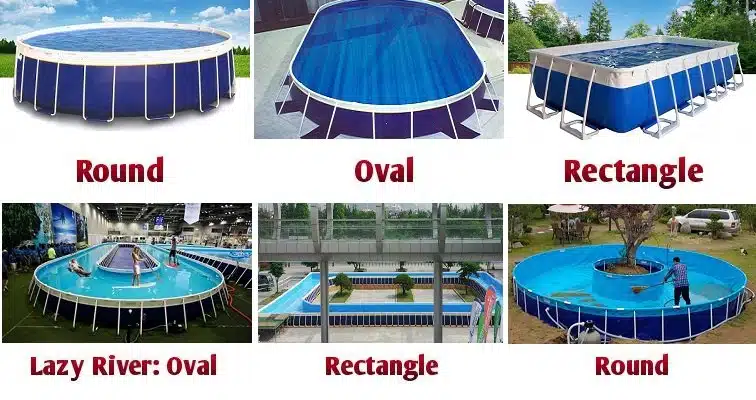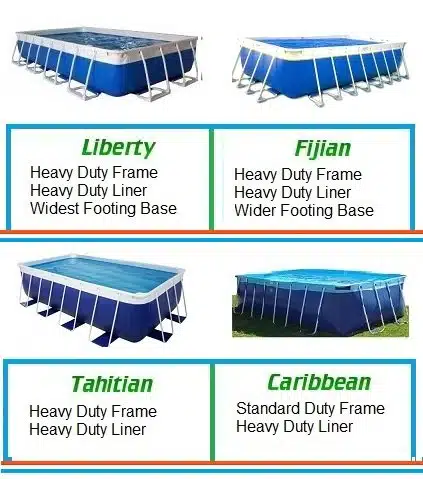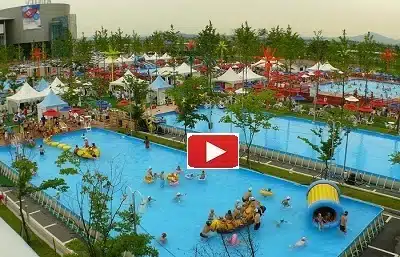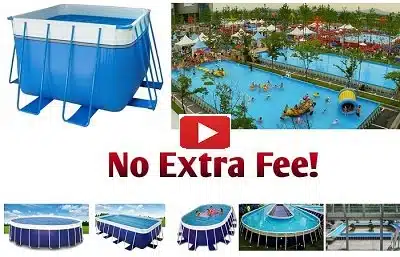Custom Above Ground Pools El Paso Texas
Custom Made Pools Info by paradise pools gives you lots of options!
- Choose Your Shape:
Custom Made Pools Info
2. Choose Your Style
Custom Made Pools Info
3. Choose Your Size
We can make any size pool
- The Smallest Width 4ft
- The Largest Width 50ft
- The Smallest Length 4ft
- The Largest Length 80ft
- The Shallowest Height 24in
- The Deepest Height 60in
To begin the order process, complete the quote request above or call at 1-213-238-2894
- Any Size from 4ft x 4ft to 50ft x 80ft
- Many Depths 24,30,36,42,48,52 or 60in inches deep (and anything in between)
- Round Oval Rectangle Lazy River Sizes Available
- Any depth from 2ft to 5ft including multiple depth options
We can make almost any size pool you like. The prices quoted are the price you will pay, and the quotes are valid for 30 days. After that we will get you an updated quote when you are ready to order a pool. It would be unusual for the prices to raise, but it is a possibility depending on timing.
Pool Videos
Custom Made Pools Info
- Sanitizing Pool Water
Sanitizing Pool Water : Sanitization comes from adding chemicals to your water that are antibacterial in nature. You can choose to use Chlorine, Baquacil or other methods, such as salt water generators. You mst ve sure that all levels are maintained to ensure healthy water levels
The most commonly used method of sanitizing pools is application of chlorine.
You should insure that the continuous chlorine level should be kept between 1.0 – 3.0 ppm (parts per million) for proper sanitation. Stabilized chlorinating products come in several forms including 1″ and 3″ tablets, sticks, granules and floaters.
Bromine is also an effective sanitizer and offer low-odor sanitation at higher temperatures, and are ideal for spa and hot tub applications.
You can apply these products in many ways, in liquid, tablet, or granules. You can apply them through floats, through the filtering system or by adding directly. The important thing is to keep the proper levels at all times
Shocking Your Above Ground Pools
The final step in the process is to shock the pool. The addition of shock products breaks down the chloramines and destroys them. When there are organic products in the pool, chloramines can occur. Organic compounds can be things such as suntan oils, cosmetics, perspiration, etc. These things combine with the chlorine residual in your pool water.
The resulting chloramines provide no sanitizing function and can cause problems like:
- strong chlorine odor
- cloudy water,
- eye irritation,
- feed bacteria and algae
Weekly applications of Shock will reduce the chloramines (and the chlorine smell) and keep your pool functioning at top levels.
Use with care (as with all chemicals) and disperse them around the pool. Do not dump it all in one place. We do not recommended to pre-dissolve the shock in a bucket of water, as you will have in your hands a HIGHLY caustic substance
Paradise Pools Mart – Sanitizing Pool Water
Sanitizing Pool Water

Paradise Pools Mart
Our You Tube Channel
Custom Made Pools
El Paso Texas is known for its innovation and our Paradise Custom Made Pools are perfect for mountain dogs. Because they set up and take down fast (or you can leave them up all winter). Your state is one of our busiest states and lots of your neighbors have our pools in your back yard. We have logistic centers all over, especially right in the heart of Akron We would like you one of our customers and we appreciate you and stand ready to serve all of your above ground pool needs
Custom Above Ground Pools El Paso Texas

Home to many Custom Made Pools . And we know you would love to have one of ours in your backyard or business.
Custom Above Ground Pools El Paso Texas
Our Distribution Center is not open to the public and the pools do not arrive there until after they are ordered, We will ship everything to your curbside
Distribution Center
12130 Roberta Lynne Dr, El Paso, TX 79936
Custom Above Ground Pools El Paso Texas
- Pool Water Chemistry Definitions
Pool Water Chemistry Definitions
Definitions
Pool water chemistry is the most misunderstood, yet vital component to overall pool care. Not only does proper water chemistry protect the swimmers using the pool, but it also protects the swimming pool itself.
Gas heaters, electrical heat-pumps, filters, and even the vinyl-liner can all suffer severe damage from unbalanced pool water. In order to clear up some of the confusion surrounding this subject, we have listed some of the more important water chemistry terms below.
Total Hardness
Total Hardness refers to the amount of calcium and magnesium in your pool water. When total hardness is too high, scale can form causing the water to appear cloudy. When total hardness is too low, the water will corrode metal fixtures including copper components found in gas heaters and electrical heat-pumps. The total hardness should measure 150 – 300 ppm.Chlorine
Chlorine is a disinfectant designed to sanitize (kill disease-causing organisms) and oxidize (destroy ammonia, nitrogen-containing contaminants and swimmer waste). A disinfectant must be continually active in the pool water so that it may react instantaneously with bacteria, algae and other organic matter as they are introduced into the water. The level of active chlorine is called the free chlorine residual and should measure 1.5 – 3.0 ppm.Total Alkalinity
Total Alkalinity measures the amount of alkaline substances in the pool water. Alkaline substances buffer your water against sudden changes in the pH. When the total alkalinity is too low, the water will corrode metal fixtures including copper components found in gas heaters and electrical heat-pumps.Low total alkalinity could also cause staining and weaken your vinyl liner, causing it to wrinkle. The total alkalinity should measure 80 ppm for swimming pools using granular chlorine, or 100 – 120 ppm for swimming pools using stabilized chlorine such as chlorine tablets.
pH
pH refers to the intensity of acid or alkaline materials in your pool water. pH is measured on a pH scale extending from 1 (extremely acidic) to 14 (extremely alkaline). A pH of 7.0 is considered to be neutral. High pH (higher than 7.8) can cause eye and skin irritation, reduce the sanitizing action of chlorine, and cause the water to appear cloudy. Low pH (less than 7.2) can cause eye and skin irritation and corrode metal fixtures including copper components found in gas heaters and electrical heat-pumps. The pH should measure 7.2 – 7.8.Cyanuric Acid (Chlorine Stabilizer)
Cyanuric acid lengthens the life of chlorine in the pool water. Chlorine products that contain cyanuric acid as an ingredient are referred to as “stabilized chlorine”. These types of chlorine are used to maintain consistent levels of chlorine in the pool water. But they are not very effective at clearing cloudy water or killing algae.For pools that use “non-stabilized chlorine”, that is chlorine that does not have cyanuric acid as an ingredient, cyanuric acid should be added in the spring when the pool is clear and the water is balanced. The cyanuric acid level should measure 40-80 ppm.
Pool Water Problems and Solutions
Cloudy Water
Pool water can turn cloudy for a variety of reasons. The most common cause of cloudy water is either dead algae floating in the pool water or other small particles floating in the water such as dissolved leaves.The best way to treat a cloudy pool is chlorine, chlorine, and more chlorine. You should add a large dose of non-stabilized chlorine (either calcium hypochlorite or sodium hypochlorite) each day for four to five days straight, keeping your free chlorine level above 3 ppm at all times and running the pool filter 24 hours a day. If this does not clear your water, then you can try clarifiers and other products. But first shock your pool water.
Pool Water Chemistry Definitions
Algae are microscopic plants which can transform your pool water from clear blue to a swamp in as little as 24 hours. Spores are introduced into the pool through the air, from rain water, and from swimmers walking across the grass and then jumping into the pool. Algae blooms are common after heavy rain showers and when the pool water temperature is high. There are many types of algae, the most common in our area being green algae, mustard algae, and black algae.
Pool Water Problems and Solutions
The most effective way of preventing algae growth is to maintain a free chlorine level of at least 1.5 ppm at all times, run the pool filter 24 hours a day, and to add a dose of algaecide once a week. We have also found that adding Algaecide to the pool water decreases your chances of suffering from an algae bloom. An Algaecide acts as an inhibitor against algae growth by lowering algae’s ability to process carbon dioxide in the water making it difficult for an algae spore to germinate and grow. If you do develop algae, apply the appropriate algaecide, shock the pool, and brush down the entire pool causing the algae to become suspended in the pool water. The next day, if anything settles out, vac it out to “Waste”.
Pool Water Chemistry Definitions
If minerals are present in the pool water, they can cause the pool water to turn green, brown, yellow, and even purple. The water would look clear but discolored. It can be very difficult to distinguish between green water caused by green algae and green water caused by a mineral problem. A telltale sign of a mineral problem is the discoloring of the pool water shortly after shocking the pool. If this occurs, you will need to add a mineral sequester to the pool. Exactly how much is a guess. We have seen cases where one bottle has solved the problem, and others where multiple bottles were needed.
Minerals
Mineral problems are a tough nut to crack. The pool industry is just now trying to get a handle on it. Stains on the vinyl liner are also treated by adding a mineral sequester. Persistent stains might need to be treated with an “on contact” product. These must be applied directly to the stained area of the pool. If the stain is on the bottom of the pool, applying the product directly on the stain can be tricky, but possible.
Low pH
Due to the acidic nature of our tap water and our rain. We tend to suffer more from low pH pool water than from high pH pool water. Fortunately, correcting the pH balance of your pool water is quite simple. All you need to do is add pH Increaser (also called soda ash and base). But before you add pH Increaser be sure to get your Total Alkalinity balanced first. Once the Total Alkalinity is balanced, the pH can be adjusted more accurately.
Pool Water Chemistry Definitions

Paradise Pools Mart
Our You Tube Channel

Paradise Pools Mart
Our You Tube Channel


